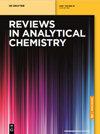The effect of selenium, zinc and copper on the excretion of urinary modified nucleobases in rats treated with prostate cancer cells
IF 3.6
3区 化学
Q2 CHEMISTRY, ANALYTICAL
引用次数: 0
Abstract
Abstract Given the strong associations between diet and cancer risk, there is considerable scientific interest in determining whether dietary factors associated with prostate cancer cell implantation may influence epigenetic alternations. The aim of the research was to assess impact of selected trace elements (selenium, zinc and copper) on the kinetics of changes (10-13-14-21 week of life cycle of rats) in the level of 7-methylguanine, 3-methyladenine, 1-methylguanine and 8-oxo-guanine in the urine of rats with implanted prostate cancer cells (LNCaP). Modified nucleobases were determined by validated high performance liquid chromatography coupled to mass spectrometry (LC-MS/MS) method using multiple reaction monitoring (MRM) mode. In the presented model the implantation of rats with cancer cells did not affect the level of the examined biomarkers in the rats’ urine. The level of methyl derivatives was statistically significantly reduced with the age of the examined rats. The implantation of rats with cancer cells results in the appearance of tumors in 71% of the rats obtaining the standard diet and respectively in 25% of those supplemented with selenium. Supplementation with selenium affects both the effectiveness of tumor induction and the concentration of 7-MeG, 3-MeA, 1-MeG and 8-oxoG in urine of the examined rats. These findings show that modified nucleosides can play an important role in cancer prevention.硒、锌和铜对前列腺癌细胞处理后大鼠尿修饰核碱基排泄的影响
鉴于饮食与癌症风险之间的密切联系,确定与前列腺癌细胞植入相关的饮食因素是否会影响表观遗传改变,存在相当大的科学兴趣。本研究旨在探讨微量元素(硒、锌和铜)对移植前列腺癌细胞(LNCaP)大鼠尿液中7-甲基鸟嘌呤、3-甲基腺嘌呤、1-甲基鸟嘌呤和8-氧鸟嘌呤变化动力学(10-13-14-21周)的影响。经验证的高效液相色谱-质谱联用(LC-MS/MS)方法采用多反应监测(MRM)模式对修饰的核碱基进行测定。在本模型中,植入癌细胞的大鼠不影响大鼠尿液中所检测的生物标志物的水平。甲基衍生物的水平随受测大鼠的年龄而显著降低。植入癌细胞的大鼠在获得标准饮食的大鼠中有71%出现肿瘤,在补充硒的大鼠中分别有25%出现肿瘤。补充硒既影响肿瘤诱导效果,也影响尿中7-MeG、3-MeA、1-MeG和8-oxoG的浓度。这些发现表明,修饰的核苷在癌症预防中发挥着重要作用。
本文章由计算机程序翻译,如有差异,请以英文原文为准。
求助全文
约1分钟内获得全文
求助全文
来源期刊

Reviews in Analytical Chemistry
化学-分析化学
CiteScore
7.50
自引率
0.00%
发文量
15
审稿时长
>12 weeks
期刊介绍:
Reviews in Analytical Chemistry publishes authoritative reviews by leading experts in the dynamic field of chemical analysis. The subjects can encompass all branches of modern analytical chemistry such as spectroscopy, chromatography, mass spectrometry, electrochemistry and trace analysis and their applications to areas such as environmental control, pharmaceutical industry, automation and other relevant areas. Review articles bring the expert up to date in a concise manner and provide researchers an overview of new techniques and methods.
 求助内容:
求助内容: 应助结果提醒方式:
应助结果提醒方式:


